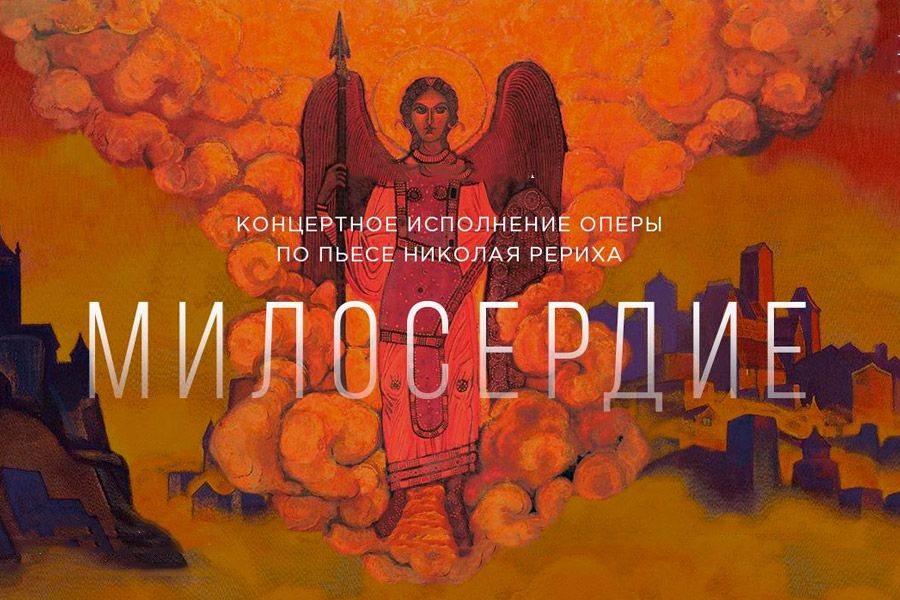
Boris Stepanov
Evgenia Muravyova
Gleb Peryazev
Opera by Alexander Tchaikovsky (concert performance)
Performed in Russian (with simultaneous subtitles in Russian)
Dedicated to the 150th anniversary of the birth of Nicholas Roerich
PERFORMERS
Gayatri – Boris Stepanov
Elena – Evgenia Muravyova
Antony – Gleb Peryazev
Nicolaus – Anton Perminov
David – Roman Malakanov
Alexander – Yuri Borshchev
Philaret – Daniil Paderin
Paul – Artyom Savchenko
Choir F.E.S. (Forma. Energia. Scaena)
Mariinsky Theatre Symphony Orchestra
Duration: 2 hours 25 minutes.
The concert includes one intermission.
CREATORS AND PRODUCERS
Music by Alexander Tchaikovsky
Libretto by Nikolai Denisov based on Nikolai Roerich’s play
Director – Ilya Ustyantsev
Producers – Tatyana Antonovskaya, Dmitry Dedukh
Artistic Production Director – Alexander Shalaev
Sound Engineer – Alexey Tarasov
Sound Design – Pyotr Tuchkov
Video Artist – Grigory Yatsentkovsky
Chief Rehearsal Pianist – Anatoly Kuznetsov
Choirmaster – Artem Khamatnurov
SYNOPSIS
In the poetic, wise, and humane state envisioned by Nikolai Roerich, nestled amidst the Himalayas, a rebellion of the masses unfolds. The bandit leader Garvey and his gang start overpowering the virtuous army that guards the citadel of science, art, and knowledge. These sacred concepts are protected primarily by the elders elected by the people, who devote themselves to pure sciences: Alexander, Paul, Philaret, David, and their leader, Nicolaus.
Fearful of the mob’s rampage, the elders decide to summon Gayatri, the Son of the Sun, who had left their land to live in the Silent Grove, communing with animals and birds. They journey to the grove to seek his help.
Gayatri lives in harmony with nature, but his peace is interrupted by a traveler named Antony. Tormented by unrequited love for a dreamlike maiden, Antony decides to return to the city to defend it. When the elders persuade Gayatri to aid them, he prays to the supreme deity for victory over the dark forces, becoming a divine instrument of justice.
Amidst battles, betrayals, and love, Gayatri emerges as a beacon of light and justice. In a climactic scene, he refuses to grant a merciful death to the defeated bandits, making them endure their prophetic nightmares. The opera concludes with a triumph of wisdom and mercy, underlining humanity’s eternal quest for truth and light.
NOTES ON THE OPERA
The opera Mercy by Alexander Tchaikovsky is based on Nikolai Roerich’s only surviving play, written in November 1917. It explores themes of the eternal struggle between knowledge and ignorance. Tchaikovsky and librettist Nikolai Denisov introduced new elements, including a love story, to adapt the mystical play for the stage.
Premiered on April 18, 2024, at Moscow’s Zaryadye Concert Hall, the production marks the 150th anniversary of Roerich’s birth. The Mariinsky Theatre’s performance will feature concert staging with a video backdrop inspired by Roerich’s paintings.
Alexander Tchaikovsky, a People’s Artist of Russia, is a celebrated composer and conductor, known for his diverse musical works, including opera, symphonies, and chamber music. His compositions blend classical traditions with modern musical expressions.